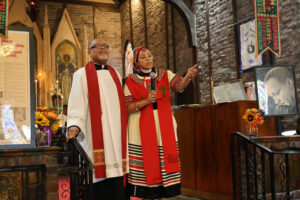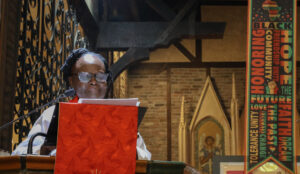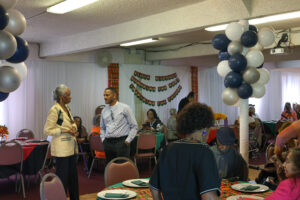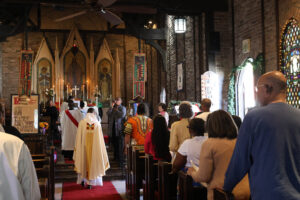
Opening procession at the Feb. 22 celebration of the Feast of Absalom Jones, Church of the Advent. Photo: Mostyn Trudinger-Smith
At the diocesan celebration of the Feast of Absalom Jones Feb. 22, Ben Harper’s “With my Own Two Hands” resonated through the Church of the Advent, Los Angeles as the service began. “I can change the world /with my own two hands /make a better place /with my own two hands,” sang a soloist as the opening procession made its way to the chancel.
The celebration was presented by the Episcopal Diocese of Los Angeles Program Group on Black Ministry and the Union of Black Episcopalians H. Belfield Hannibal Chapter, along with the Rev. Vanessa Mackenzie, rector of Church of the Advent. The Very Rev. Paul Daniels, dean of Bloy House, was celebrant.
The Rev. Absalom Jones was the first Black priest in The Episcopal Church, and a lifelong abolitionist and social organizer. Born into slavery in Delaware in 1746, he was still able to attend some school and learn reading, writing, and mathematics. Forced to work at his enslaver’s retail store, he was able to find other work in the evenings and keep his earnings. In 1770 he married Mary Thomas and purchased her freedom in 1778. Jones sought freedom from his enslaver several times and in 1784 he was set free.
Jones was a leader of the Free African Society, a social and political humanitarian organization, and a lay preacher at St. George’s Methodist Episcopal Church in Philadelphia. Eventually Jones and his congregation were forced out of that church, and he helped to form “The African Church,” which became The African Episcopal Church of St. Thomas. In 1802, Jones was ordained as the first Black Episcopal Priest. Throughout his life, Jones was dedicated to abolitionism and caring for the vulnerable in the community. He died in 1818.
The Union of Black Episcopalians stands in the tradition of Absalom Jones and is dedicated to the 200 years of Black ministry in The Episcopal Church from Absalom Jones to the present. The Union has over 55 chapters and groups throughout the continental United States and the Caribbean.
The Rev. Guy Leemhuis, the president of the H. Belfield Hannibal Chapter of the Union of Black Episcopalians, and Canon Suzanne Edwards-Acton, co-chair of the diocesan Program Group on Black Ministries, welcomed worshipers on behalf of those organizations to celebrate Absalom Jones.
“My mom was raised at St. Thomas Church; that’s where my parents were married, and some of my family members still attend and sing in the choir,” said Edwards-Acton. She expressed gratitude for the support of Bishop John Harvey Taylor, who offered online greetings while attending a diocesan Commission on Ministry retreat.
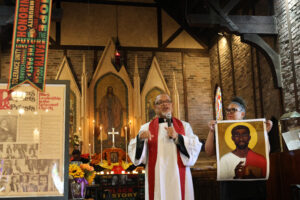
The Rev. Guy Leemhuis (left) and Canon Suzanne Edwards-Acton present the church with a Black Christ icon painting. Photo: Mostyn Trudinger-Smith
Leemhuis presented the congregation with an icon painting of “Black Christ,” created by the Rev. Canon Warner R. Traynham. Leemhuis said he hopes to eventually have the icon displayed in every church in the diocese. “It’s an opportunity for all of us to see God in the other, whatever the other is to you, because the point is that your neighbor is not the person who looks at acts and is culturally just like you,” Leemhuis said. “God is all of us and doesn’t exclude anybody.”
“We are inviting churches as beloved community steps to begin a transformation that will curate a tapestry of images of various cultural groups in the image of God including ways to express God in the feminine and nonbinary,” he told The Episcopal News later.
“The Kaleidoscope God is the most accurate and inclusive understanding of how through art we can imagine that God looks like all of us, thereby connecting us in ways to not see our neighbors as the other but as family. That’s the dream of God, that we be united and reconciled as children of God. This is a small but important step. Imagine our children coming into our sacred spaces and being able to see that they look like they belong. It dismantles the message that God is exclusive to any one community.”
Leemhuis also offered libations to the ancestors, calling for the presence of ancestors and thanking civil rights activists and all those who have heeded the call to fight for equality and the recognition of the unity of all people in God.
The Rev. Joy Magala, priest-in-charge of St. Mary’s Mariposa, Los Angeles, gave a sermon about a 14-year-old boy she knew from her Ugandan youth group, who was murdered while walking to his basketball practice a few years ago. At the funeral at city hall, Magala said, important people and celebrities were giving speeches condemning the senseless violence, when the boy’s mother interrupted, screaming ‘Stop, stop! Where have you been? Where were you when we are going through suffering? Stop, stop. Where have you been?’
Many people, Magala said, are comfortable remaining aloof to the suffering around them. She said that we do not celebrate Absalom Jones merely because he was the first ordained Black Episcopal priest, but because “Blessed Absalom Jones loved God and people in action.” He loved his neighbors as himself, and was not aloof, Magala said, unlike so many gathered at City Hall that day. Jones, Magala said, lived out the radical love that Jesus calls all of us to.
“Love is about being willing to let down portions of your life for the other or for others. Love is about being willing to take off a few hours of your Saturday and visit a prisoner,” she said. “Love is about being willing to get off that couch and join hands with those organizations that fight against homelessness, advocate for affordable housing, living wages, and so on. Love is about joining hands with the community where God has placed you and fighting for its well-being. I want to invite you today to open your eyes to look around you and see where the need is, and when you see that need, pray about it and see how you can come alongside God’s people.”
After the service, Church of the Advent hosted a reception, offering food and welcoming fellowship.
The Rev. Pat McCaughan contributed reporting

